I’m writing to you from the land of figgy pudding, carol concerts and endless streets strung with Christmas lights.
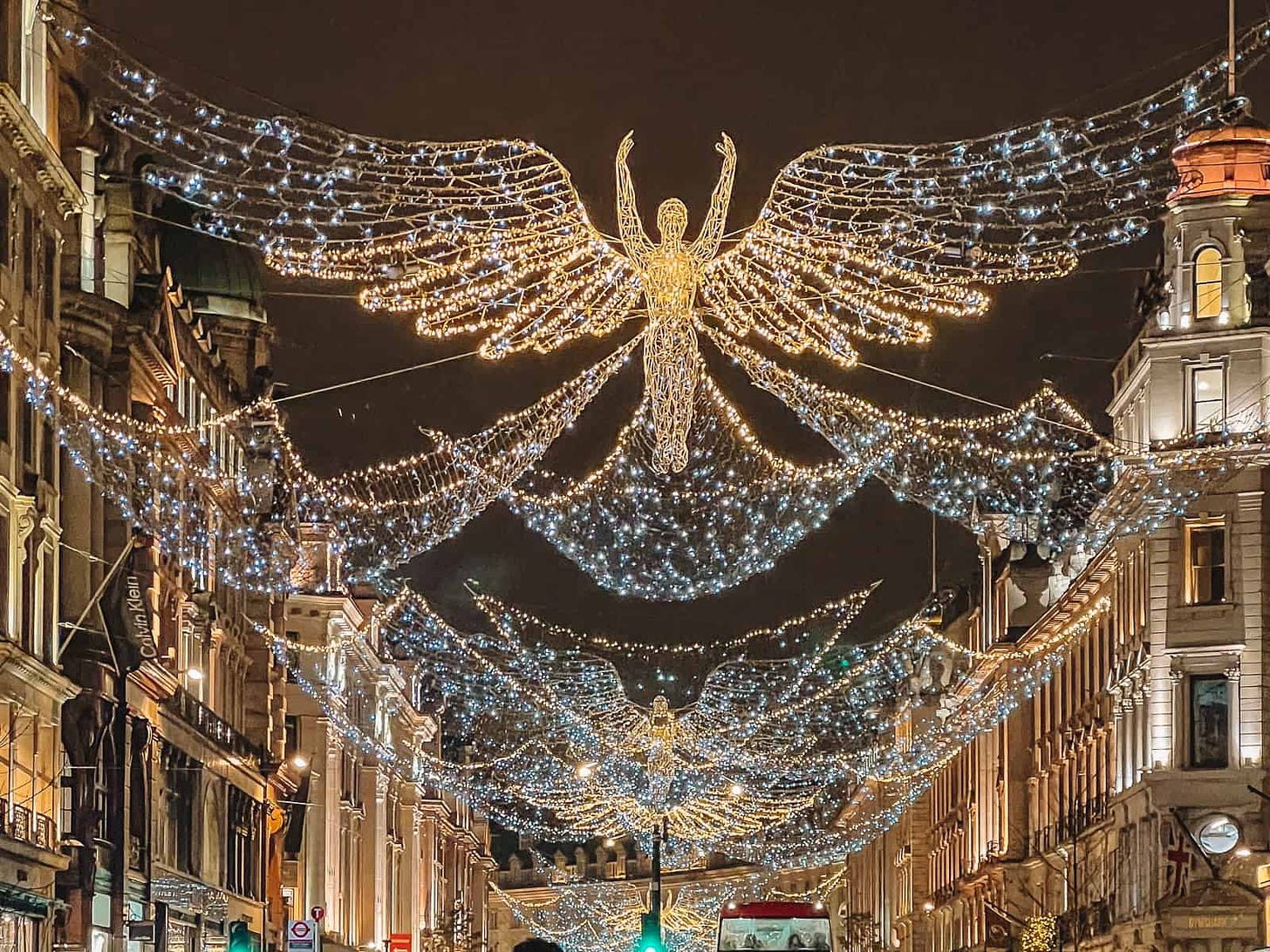
December in London – my favourite time of the year. The city is jammed; one taxi driver told me it was the busiest he’d ever seen it in thirty years of driving. I made the mistake of trying to walk Oxford Street between meetings, only to find myself sandwiched in a mosh pit of humans, moving forward one quarter-step at a time.
I missed you in October, when I was flattened by Covid and had to cancel my trip to the UK. And into November, busily researching a new novel in southern Italy, and like everyone else, watching with horror the civilian deaths and displacements in Israel and Gaza as war rages on.
I’ve also been paying attention to the terrible situation in Sudan, where more than 10,000 people have been killed and 5 million displaced by an ethnic-based war between the army and the Arab paramilitary Rapid Support Forces, which grew out of the Janjaweed, brutal fighters I first researched years ago for their widespread use of rape as a war crime.
My new novel focuses on migration and the shifting EU political sands to the right. After a boat sinks off the Apulian coast having set out from Tunisia, politicians and international aid agencies flock to the area, each with their own conflicted agendas. At the heart of the story lies a mystery where the political and personal collide, of a long-held secret and a blood debt that must be paid.
The G7 takes place in Puglia, Italy next June and that partially forms the backdrop of my novel. For a decade, I belonged to a G7/G20 research group based at the University of Toronto, and attended the global summits, which were quite the education. So, I’ve been reading deeply about migration patterns, including from Sub-Saharan and North Africa, as well as European politics.
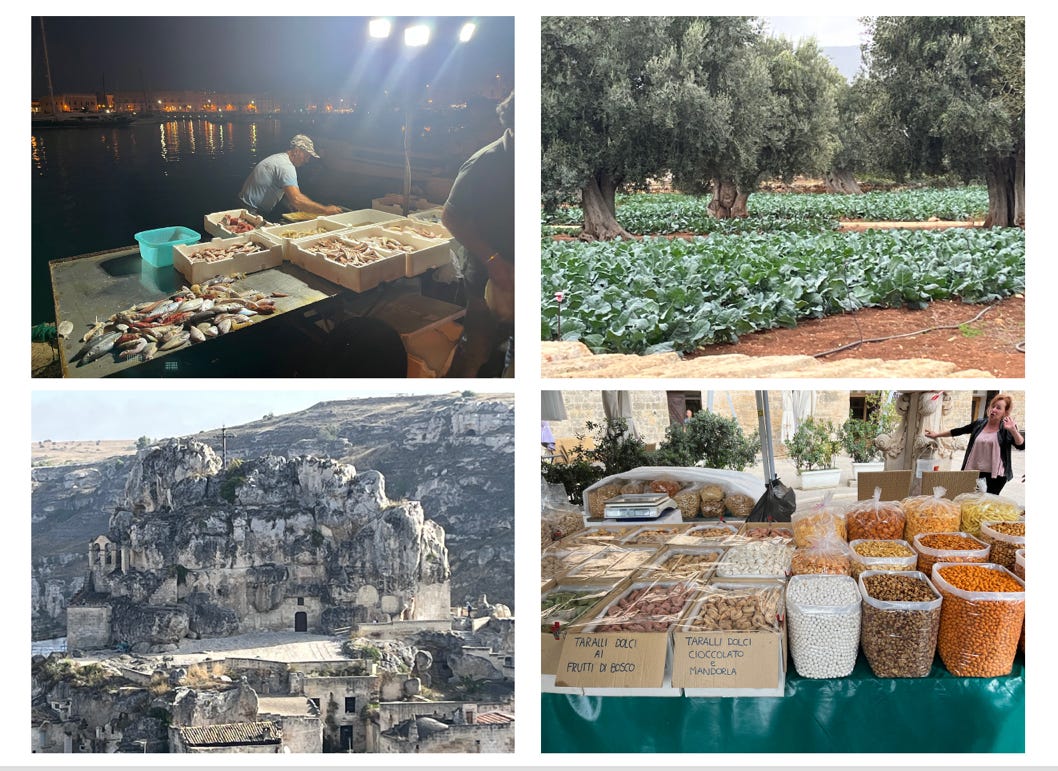
Puglia is often described as the heel of Italy’s boot, a 7,500 square mile area in the southeast of the country, bordered by the Adriatic and Ionian Seas. It’s a land of ports where fishermen sell their wares at day’s end. Of rock churches and olive groves (40% of Italian olive oil is Apulian). And of delicious food without pretension – fresh vegetables, just-caught seafood, orecchiette with broccolini, pureed chickpeas with chicory, and the best bread ever.
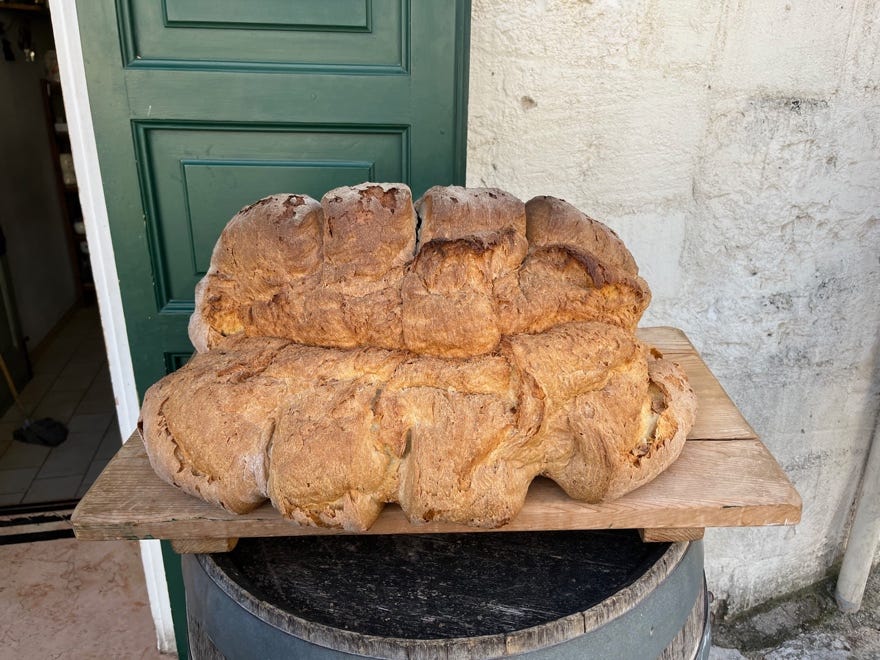
Southern Italy has always been the poorest region in the country, one that voted overwhelmingly against the 1861 unification of Italy. The first large waves of emigration started shortly thereafter; it’s estimated that 80% of the Italian communities in North America come from the south.
Puglia was traditionally called the ‘doorway to the Middle East and the Orient.’ It has seen massive transformations over millennium due to its strategic shipping position, as well as being the departure point for pilgrims headed to the Holy Land.
First populated in the Palaeolithic age by Italic peoples and colonized by the Greeks in 8th century BC, it was subsequently conquered in turn by the Byzantines, Saracens, Normans, Austrians, Spanish, French, Bourbons, Sicilians, and then through forced unification in a country where power and wealth resided in the north.
Conquer, surrender, resistance and change – essentially the history of the world and mankind.
Throughout Puglia, the accumulated footprint of different cultures is obvious. Churches destroyed and rebuilt in new styles on the same site. Food reimagined with different spices and ingredients. Constantly changing boundaries and names. Intercultural and interfaith marriages.
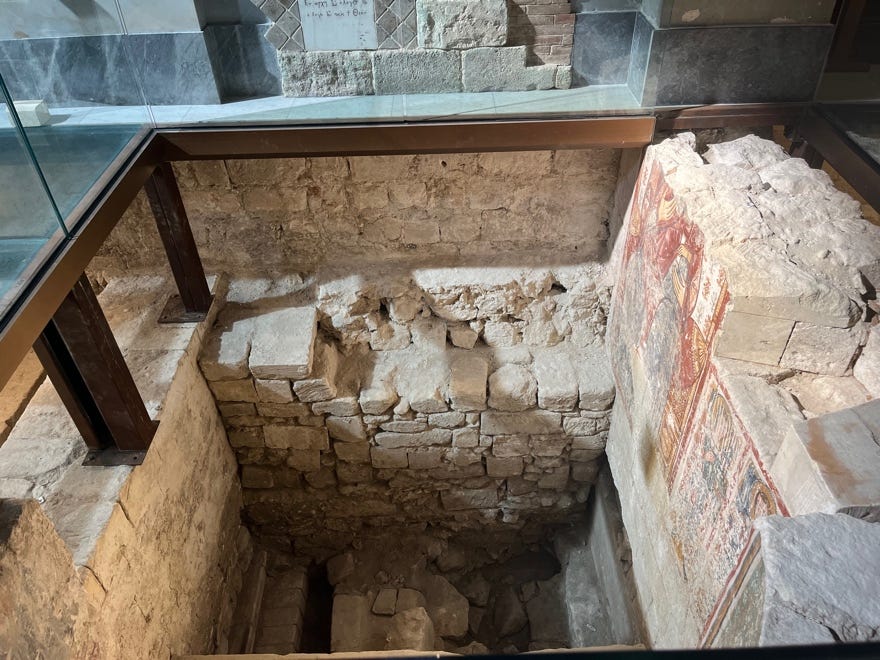
(Many churches have glass floors to display pieces of ancient buildings underneath.)
Trani was the capital of Puglia until the Napoleonic age (when it was moved to Bari just south on the Adriatic coast). It was home to southern Italy’s largest Jewish community, with a Jewish quarter adjacent to the port. They were actively involved in shipping and commercial life, helping create the world’s first Maritime laws (signed in Trani, 1063) which are still valid around the world today.
By the 15th century, Tranese Jews faced serious persecution under the Spanish who had sought to ‘cleanse’ Spain of both Jews and Muslims, then carried on their mission in Italy. In a whirlwind of pogroms that followed, most Jews were forced to convert to Christianity or expelled, leaving only a small community intact today.
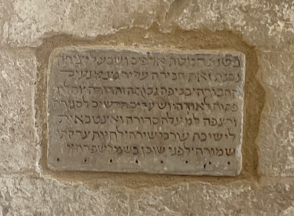
Of the four original medieval synagogues, two were destroyed; another, Sant’Anna, was converted to a church, then eventually made into a historical museum. Scolanova, the last shul, remains in use although by the time I arrived in mid-October, it had been defaced and was locked for security reasons.
I thought back to Puglia recently as I read the latest Vital Signs Report from the Toronto Foundation. Toronto is a city of ever more lonely people. Lengthy covid lock-downs took their toll. The report says we’re interacting less with others; volunteering and donating less; and reporting increased depression and anxiety.
Not surprising, but disturbing nonetheless.
One of the most charming things I found about Puglia was the communal aspects, including “La passaggeiata,” the evening ritual between 6-8pm, when whole families promenade through the town, greeting each other and enjoying time together.
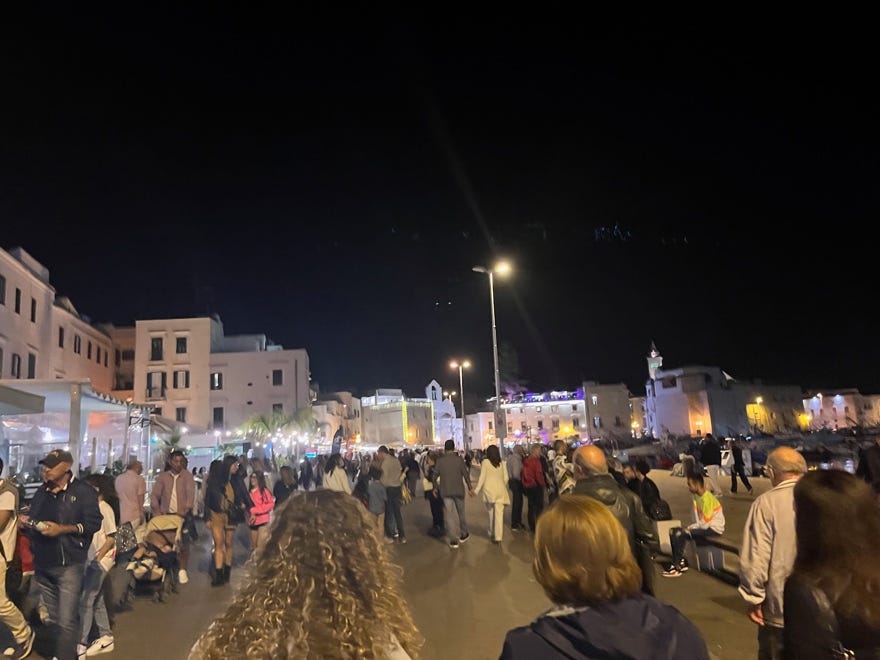
Those who can’t easily walk prop themselves up on chairs outside their buildings or on benches. Older women go to church in the early evening to get the local gossip while their husbands group together in town for a gossip of their own.
This is of course easier in smaller town than large cities. And not all of us have a mild climate. But there was something fun about the deliberate socialization at the beginning of the pandemic – the zoom drinks, the gathering outside around firepits, the walk dates with girlfriends – that fell away as the world opened up. Yet, our old social patterns haven’t fully returned, leaving a hole.
Nothing in life is achieved without deliberate effort. Social justice. Elimination of poverty. The slaying of loneliness. Or peace.
Last weekend, I sat in St Martin’s in the Field, Trafalgar Square, for their annual Carols by Candlelight concert. It was interspersed with readings, including I Heard The Bells on Christmas Day by H.W. Longfellow. The poem’s narrator Henry tells of a nation and family divided by civil war. He’s silenced by grief, despairing “for hate is strong // and mocks the song // of peace on earth, good will to men.”
As that line was read, the voice of the young woman was drowned out by a cacophony of police sirens racing past, their blue lights flashing bright through the stained-glass windows into the darkened church. Hundreds of heads swivelled, I’m sure thinking like I did, of the irony of the words at this moment in time.
The reader carried on, her voice reignited by a poem which finds hope in the end.
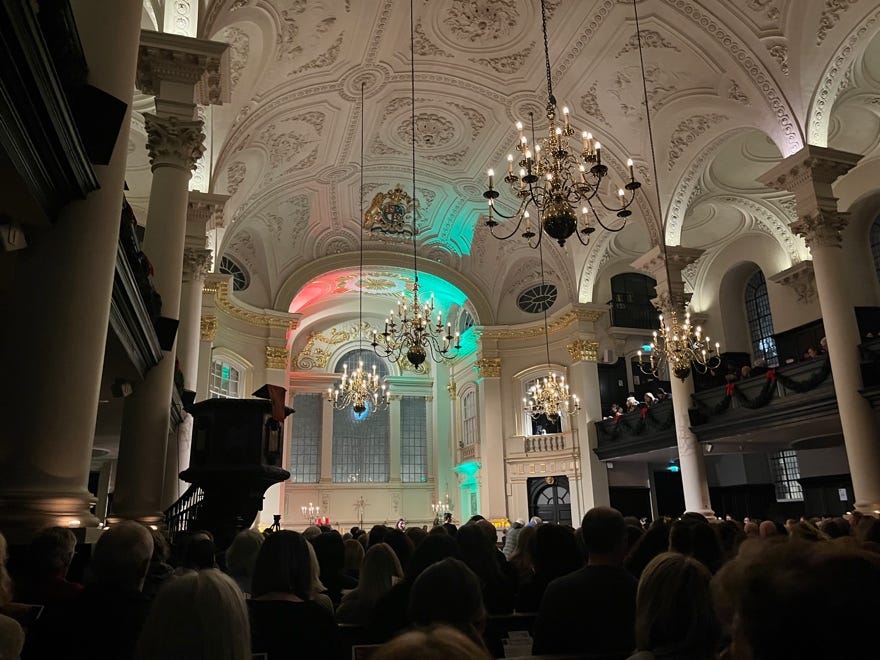
It’s a dark time right now. Watching the news feels like a body blow, and our frustration and hopelessness at the violence and suffering too often spills over into conflicts with one another at home. None of us have a singular truth. All of us engage in different ways. I hope we can treat each other with compassion as we seek greater security for all.
Filmic Italy.
While in Puglia, I based myself for a few days in picturesque Polignano a Mare, with its famous beach, Cala Monachile.
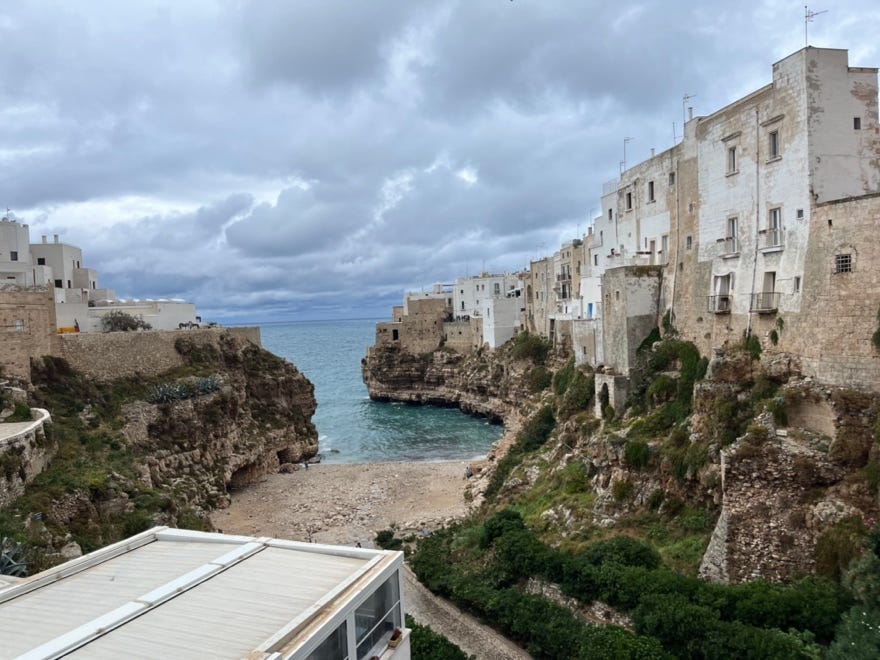
Polignano is entirely charming, with amazing restaurants, friendly locals and of course gorgeous beaches. (Warm enough to swim at the end of October. . .) Turns out that a decade ago, Polignano was just one of many lovely towns along that mid-Apulian coast between Bari and Brindisi, not yet the tourist mecca it became.
What shifted its fate? An episode of US soap The Bold and The Beautiful, who filmed the long-awaited wedding between Hope and Liam in 2012 on the now famous bridge. The location shoot was designed to reward faithful Italian viewers (11% of the show’s audience), and the travelogue went viral. Voila, pics of Polignano were flooding our Instagram accounts.
All of Italy is of course a film set. The list of movies who have shot there is long. Actors love it, too. Justin Timberlake and Jessica Biel married at the very posh Borgo Ignazia in Puglia; also a favourite of Madonna, the Beckhams, and many celebrities. British actress Helen Mirren is a long-time Puglia resident, as is reportedly Meryl Streep, Mickey Rourke, Francis Ford Coppola, among others.
Much more to say about Italy, and lots of new film and book recommendations. But that will need to wait until the next newsletter, which will arrive more promptly than this one!
Bye for now. Thank you for joining me for this twenty-fourth edition of Letterbox.
